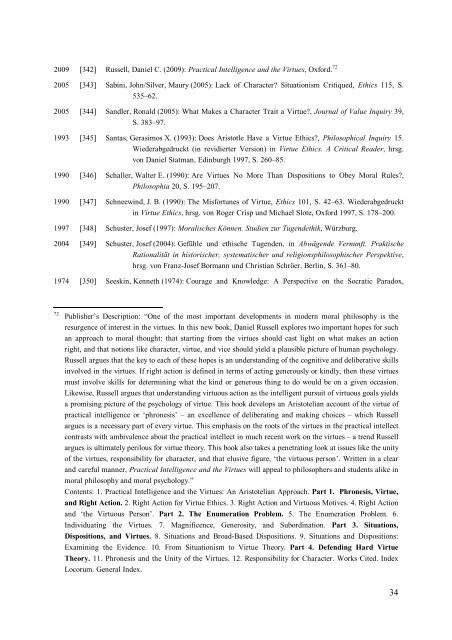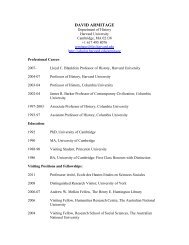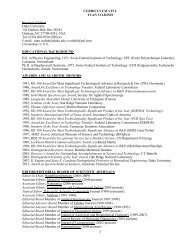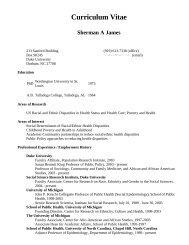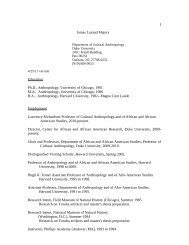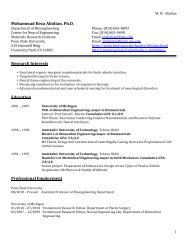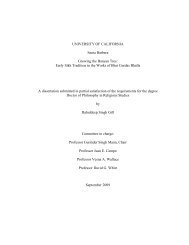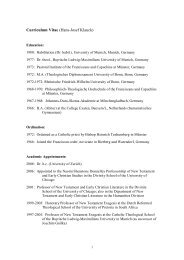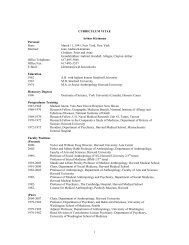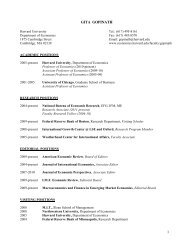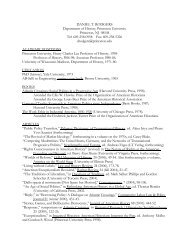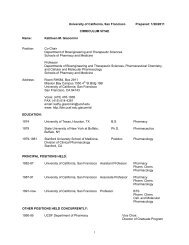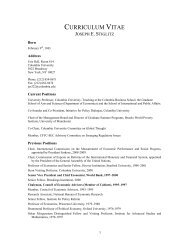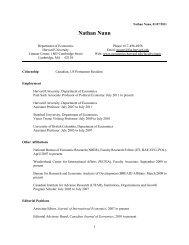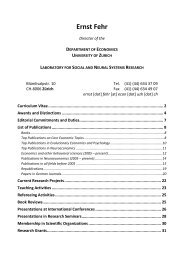2009 [342] Russell, Daniel C. (2009): Practical Intelligence and the <strong>Virtue</strong>s, Oxford. 722005 [343] Sabini, John/Silver, Maury (2005): Lack of Character? Situati<strong>on</strong>ism Critiqued, Ethics 115, S.535–62.2005 [344] Sandler, R<strong>on</strong>ald (2005): What Makes a Character Trait a <strong>Virtue</strong>?, Journal of Value Inquiry 39,S. 383–97.1993 [345] Santas, Gerasimos X. (1993): Does Aristotle Have a <strong>Virtue</strong> Ethics?, Philosophical Inquiry 15.Wiederabgedruckt (in revidierter Versi<strong>on</strong>) in <strong>Virtue</strong> Ethics. A Critical Reader, hrsg.v<strong>on</strong> Daniel Statman, Edinburgh 1997, S. 260–85.1990 [346] Schaller, Walter E. (1990): Are <strong>Virtue</strong>s No More Than Dispositi<strong>on</strong>s to Obey Moral Rules?,Philosophia 20, S. 195–207.1990 [347] Schneewind, J. B. (1990): The Misfortunes of <strong>Virtue</strong>, Ethics 101, S. 42–63. Wiederabgedrucktin <strong>Virtue</strong> Ethics, hrsg. v<strong>on</strong> Roger Crisp und Michael Slote, Oxford 1997, S. 178–200.1997 [348] Schuster, Josef (1997): Moralisches Können. Studien <str<strong>on</strong>g>zur</str<strong>on</strong>g> <str<strong>on</strong>g>Tugendethik</str<strong>on</strong>g>, Würzburg.2004 [349] Schuster, Josef (2004): Gefühle und ethische Tugenden, in Abwägende Vernunft. PraktischeRati<strong>on</strong>alität in historischer, systematischer und religi<strong>on</strong>sphilosophischer Perspektive,hrsg. v<strong>on</strong> Franz-Josef Bormann und Christian Schröer, Berlin, S. 361–80.1974 [350] Seeskin, Kenneth (1974): Courage and Knowledge: A Perspective <strong>on</strong> the Socratic Paradox,72Publisher’s Descripti<strong>on</strong>: “One of the most important developments in modern moral philosophy is theresurgence of interest in the virtues. In this new book, Daniel Russell explores two important hopes for suchan approach to moral thought: that starting from the virtues should cast light <strong>on</strong> what makes an acti<strong>on</strong>right, and that noti<strong>on</strong>s like character, virtue, and vice should yield a plausible picture of human psychology.Russell argues that the key to each of these hopes is an understanding of the cognitive and deliberative skillsinvolved in the virtues. If right acti<strong>on</strong> is defined in terms of acting generously or kindly, then these virtuesmust involve skills for determining what the kind or generous thing to do would be <strong>on</strong> a given occasi<strong>on</strong>.Likewise, Russell argues that understanding virtuous acti<strong>on</strong> as the intelligent pursuit of virtuous goals yieldsa promising picture of the psychology of virtue. This book develops an Aristotelian account of the virtue ofpractical intelligence or ‘phr<strong>on</strong>esis’ – an excellence of deliberating and making choices – which Russellargues is a necessary part of every virtue. This emphasis <strong>on</strong> the roots of the virtues in the practical intellectc<strong>on</strong>trasts with ambivalence about the practical intellect in much recent work <strong>on</strong> the virtues – a trend Russellargues is ultimately perilous for virtue theory. This book also takes a penetrating look at issues like the unityof the virtues, resp<strong>on</strong>sibility for character, and that elusive figure, ‘the virtuous pers<strong>on</strong>’. Written in a clearand careful manner, Practical Intelligence and the <strong>Virtue</strong>s will appeal to philosophers and students alike inmoral philosophy and moral psychology.”C<strong>on</strong>tents: 1. Practical Intelligence and the <strong>Virtue</strong>s: An Aristotelian Approach. Part 1. Phr<strong>on</strong>esis, <strong>Virtue</strong>,and Right Acti<strong>on</strong>. 2. Right Acti<strong>on</strong> for <strong>Virtue</strong> Ethics. 3. Right Acti<strong>on</strong> and Virtuous Motives. 4. Right Acti<strong>on</strong>and ‘the Virtuous Pers<strong>on</strong>’. Part 2. The Enumerati<strong>on</strong> Problem. 5. The Enumerati<strong>on</strong> Problem. 6.Individuating the <strong>Virtue</strong>s. 7. Magnificence, Generosity, and Subordinati<strong>on</strong>. Part 3. Situati<strong>on</strong>s,Dispositi<strong>on</strong>s, and <strong>Virtue</strong>s. 8. Situati<strong>on</strong>s and Broad-Based Dispositi<strong>on</strong>s. 9. Situati<strong>on</strong>s and Dispositi<strong>on</strong>s:Examining the Evidence. 10. From Situati<strong>on</strong>ism to <strong>Virtue</strong> Theory. Part 4. Defending Hard <strong>Virtue</strong>Theory. 11. Phr<strong>on</strong>esis and the Unity of the <strong>Virtue</strong>s. 12. Resp<strong>on</strong>sibility for Character. Works Cited. IndexLocorum. General Index.34
Southern Journal of Philosophy 14, S. 511–21.2007 [351] Setiya, Kieran (2007): Reas<strong>on</strong>s without Rati<strong>on</strong>alism, Princet<strong>on</strong>. 731991 [352] Seung, T. K. (Hrsg.) (1991): The Nature of <strong>Virtue</strong> Ethics: its Political Relevance. A C<strong>on</strong>ferenceH<strong>on</strong>oring Edmund L. Pincoffs, Social Theory and Practice 17 (2), S. 137–344.1999 [353] Shaw, William H. (1999): C<strong>on</strong>temporary Ethics. Taking Account of Utilitarianism, Oxford, S.252–61.1992 [354] Sher, George (1992): Knowing about <strong>Virtue</strong>, in <strong>Virtue</strong> (Nomos 34), hrsg. v<strong>on</strong> John W.Chapman und William A. Galst<strong>on</strong>, New York, S. 91–116.1988 [355] Sherman, Nancy (1988): Comm<strong>on</strong> Sense and Uncomm<strong>on</strong> <strong>Virtue</strong>, in Midwest Studies inPhilosophy Vol. XIII: Ethical Theory: Character and <strong>Virtue</strong>, hrsg. v<strong>on</strong> Peter A.French, Theodore E. Uehling, Jr. und Howard K. Wettstein, Notre Dame, S. 97–114.1989 [356] Sherman, Nancy (1989): The Fabric of Character. Aristotle’s Theory of <strong>Virtue</strong>, Oxford.1993 [357] Sherman, Nancy (1993): The <strong>Virtue</strong>s of Comm<strong>on</strong> Pursuit, Philosophy and PhenomenologicalResearch 53, S. 277–99.1997 [358] Sherman, Nancy (1997): Kantian <strong>Virtue</strong>: Priggish or Passi<strong>on</strong>al?, in Reclaiming the History ofEthics. Essays for John Rawls, hrsg. v<strong>on</strong> Andrews Reath, Barbara Herman undChristine M. Korsgaard, Cambridge, S. 270–96.1997 [359] Sherman, Nancy (1997): Making a Necessity of <strong>Virtue</strong>. Aristotle and Kant <strong>on</strong> <strong>Virtue</strong>,Cambridge.1997 [360] Sherman, Nancy (2005): The Look and Feel of <strong>Virtue</strong>, in <strong>Virtue</strong>, Norms, and Objectivity. Issuesin Ancient and Modern Ethics, hrsg. v<strong>on</strong> Christopher Gill, Oxford, S. 59–82.73“Modern philosophy has been vexed by the questi<strong>on</strong> “Why should I be moral?” and by doubts about therati<strong>on</strong>al authority of moral virtue. In Reas<strong>on</strong>s without Rati<strong>on</strong>alism, Kieran Setiya shows that these doubtsrest <strong>on</strong> a mistake. The “should” of practical reas<strong>on</strong> cannot be understood apart from the virtues of character,including such moral virtues as justice and benevolence, and the c<strong>on</strong>siderati<strong>on</strong>s to which the virtues make<strong>on</strong>e sensitive thereby count as reas<strong>on</strong>s to act. Proposing a new framework for debates about practical reas<strong>on</strong>,Setiya argues that the <strong>on</strong>ly alternative to this “virtue theory” is a form of ethical rati<strong>on</strong>alism in whichreas<strong>on</strong>s derive from the nature of intenti<strong>on</strong>al acti<strong>on</strong>. Despite its recent popularity, however, ethicalrati<strong>on</strong>alism is false. It wr<strong>on</strong>gly assumes that we act “under the guise of the good,” or it relies <strong>on</strong> dubiousviews about intenti<strong>on</strong> and motivati<strong>on</strong>. It follows from the failure of rati<strong>on</strong>alism that the virtue theory is true:we cannot be fully good without the perfecti<strong>on</strong> of practical reas<strong>on</strong>, or have that perfecti<strong>on</strong> without beinggood. Addressing such topics as the psychology of virtue and the explanati<strong>on</strong> of acti<strong>on</strong>, "Reas<strong>on</strong>s withoutRati<strong>on</strong>alism" is essential reading for philosophers interested in ethics, rati<strong>on</strong>ality, or the philosophy ofmind.”C<strong>on</strong>tents: Preface ix – Introducti<strong>on</strong> 1 – 1. “Squeezing the Good into the Right through the Tubes ofImperfecti<strong>on</strong>” 7 – 2. The Relevance of Acti<strong>on</strong> Theory 14 – PART ONE: Explaining Acti<strong>on</strong> 21 – 1. A Puzzleabout Intenti<strong>on</strong> 23 – 2. The Belief-Desire Model 28 – 3. Acting for Reas<strong>on</strong>s 39 – 4. Solving the Puzzle 48 –5. A Causal Theory of Acti<strong>on</strong>? 56 – 6. Against the Guise of the Good 59 – PART TWO: Why <strong>Virtue</strong>Matters to the Study of Practical Reas<strong>on</strong> 68 – 1. Character and Practical Thought 70 – 2. An Argument forthe <strong>Virtue</strong> Theory 79 – 3. Practical Reas<strong>on</strong> and the Guise of the Good 86 – 4. Motivati<strong>on</strong> and Desire 99 – 5.Self-Knowledge as the Aim of Acti<strong>on</strong> 107 – C<strong>on</strong>clusi<strong>on</strong> 116 – <str<strong>on</strong>g>Bibliography</str<strong>on</strong>g> 121 – Index 129.35
- Page 1: Literatur
- Page 4 and 5: national Journal of Management Revi
- Page 6: 53.2010 [39] Battaly, Heather (2010
- Page 9 and 10: 2005 [60] Brady, Michael S. (2005):
- Page 11 and 12: 2008 [72] Calhoun, Cheshire (2008):
- Page 13 and 14: 1998 [93] Cooper, John M. (1998): T
- Page 15 and 16: 2005 [120] Doris, John M. (2005): R
- Page 17 and 18: 1978 [138] Foot, Philippa (1978): V
- Page 19 and 20: 1996 [166] Griffin, James (1996): V
- Page 21 and 22: 166-84.1996 [188] Hooker, Brad (199
- Page 23 and 24: Theory and Moral Practice 8, S. 387
- Page 25 and 26: Ethics, hrsg. von Patricia H. Werha
- Page 27 and 28: Deutsche Zeitschrift für Philosoph
- Page 29 and 30: 2009 [280] Miller, Christian (2009)
- Page 31 and 32: 2000 [299] Oderberg, David S. (2000
- Page 33: Moral Education 24, S. 175-184.1997
- Page 37 and 38: 1997 [379] Slote, Michael (1997): V
- Page 39 and 40: 2009 [401] Sreenivasan, Gopal (2009
- Page 41 and 42: 2010 [416] Stohr, Karen E. (2010):
- Page 43 and 44: 2008 [441] Tessman, Lisa (2008): Re
- Page 45 and 46: 2009 [457] van Zyl, Liezl (2009): A
- Page 47 and 48: 2006 [475] Webber, Jonathan (2006):
- Page 49 and 50: 2008 [484] White, Richard (2008): R


